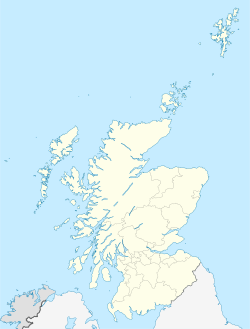 | |
| Established | 563 AD |
|---|---|
| Location | Isle of Iona PA76 6SQ, United Kingdom |
| Website | https://www.historicenvironment.scot/visit-a-place/places/iona-abbey-and-nunnery/ |


Iona Abbey is an abbey located on the island of Iona, just off the Isle of Mull on the West Coast of Scotland.
It is one of the oldest Christian religious centres in Western Europe. The abbey was a focal point for the spread of Christianity throughout Scotland and marks the foundation of a monastic community by St. Columba, when Iona was part of the Kingdom of Dál Riata. Saint Aidan served as a monk at Iona, before helping to reestablish Christianity in Northumberland, on the island of Lindisfarne.
In the 12th century, the Macdonald lords of Clan Donald made Iona the ecclesiastical capital of the Royal Family of Macdonald, and subsequent Lords of the Isles into the early 16th century endowed and maintained the abbey, church and nunnery. Two of the Macdonalds (each named Angus) became Bishops of the Isles with the bishop's seat at Iona. St. Oran's chapel was the burial place for the Lords as evidenced by their grave slabs.[1]
From 1207 to 1493, the early Clan Donald and its Lords of the Isles were entirely central to Iona abbey’s medieval existence, development and prestige. This enduring Macdonald phase equals the 300 year period of primary Columban monasticism. It is paramount in providing the sole witness to Iona’s extant architecture and is a principal witness to the surviving monuments. The Iona Abbey church was in all but name The Macdonald’s Cathedral of The Isles. Medieval Iona Abbey, as you see it today (restored in the 20th century) is largely the legacy of the 15th century Clan Donald Lords of the Isles and their Clan Donald Abbots and Bishops.
Today, Iona Abbey is the spiritual home of the Iona Community, an ecumenical Christian religious order, whose headquarters are in Glasgow. The Abbey remains a popular site of Christian pilgrimage today.[2]
- ^ Clan Donald and Iona Abbey 1200-1500 by Ian Ross Macdonnell, 2012.
- ^ Holly Hayes (2005). Iona Abbey - Iona, Scotland. Sacred Destinations.
Iona Abbey was the home of St. Columba, whose missionary work in the 6th century brought Celtic Christianity to Scotland. Now home to the ecumenical Iona Community, it remains a place of Christian pilgrimage.
